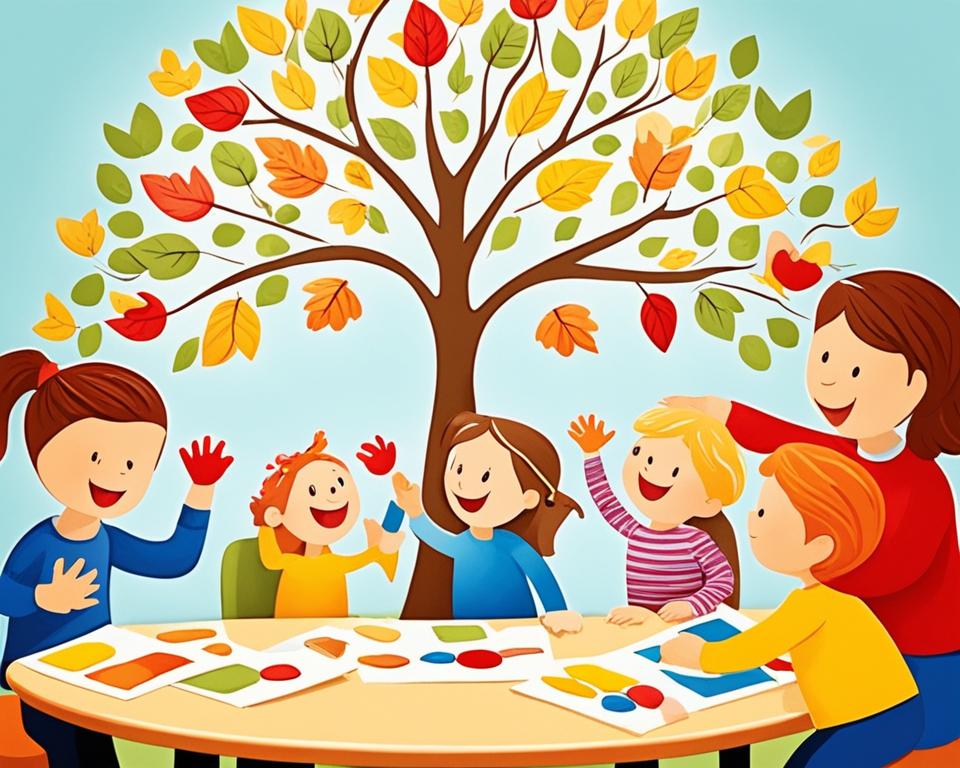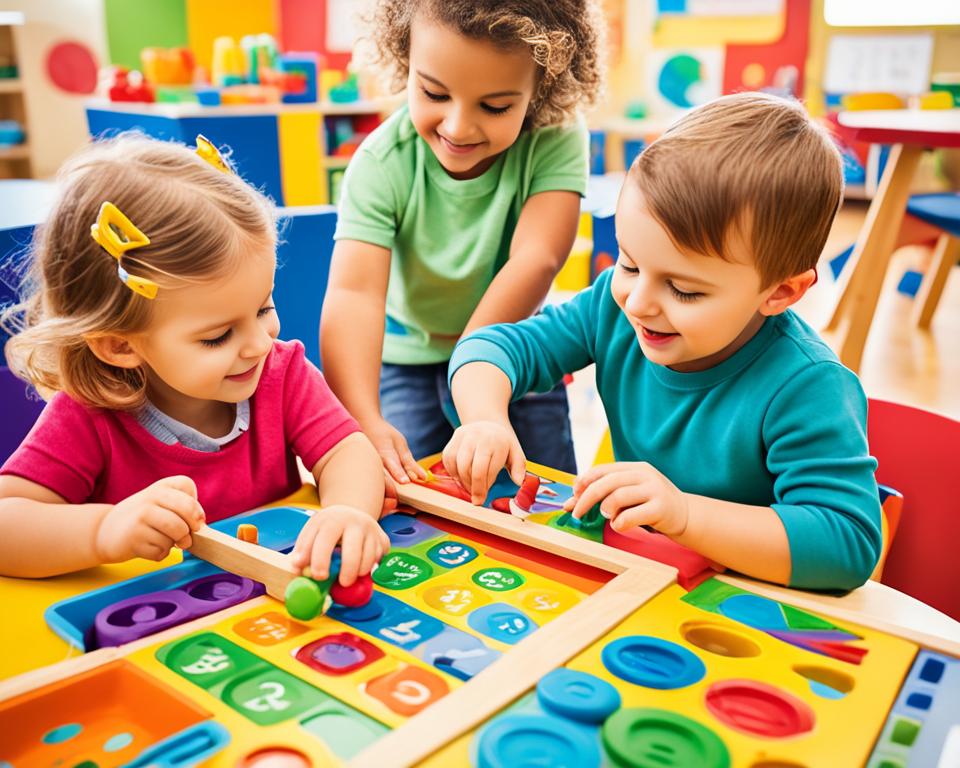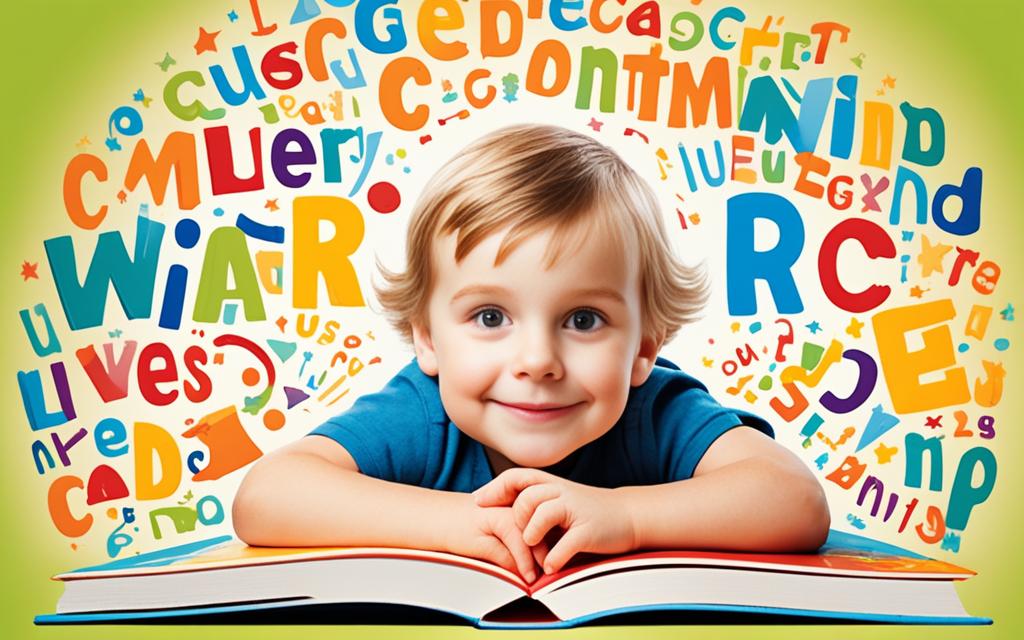As an educator, I understand the critical role that early childhood education plays in shaping a child’s future academic success and personal growth. In today’s ever-evolving landscape, educators are constantly adapting their practices to meet the changing needs of young learners. This article will explore the top trends in early childhood learning, preschool education, and kindergarten readiness, and how they benefit children’s cognitive development, language acquisition, and overall developmental milestones.
From the Montessori approach to the Reggio Emilia philosophy, educators are embracing innovative methods that foster play-based learning and an emergent curriculum. These trends not only support child brain development but also encourage the development of crucial social-emotional skills and creativity. By understanding and implementing these best practices, early childhood educators can provide the most effective and engaging learning experiences to help young children thrive.
Key Takeaways
- Early childhood education is a critical stage that lays the foundation for a child’s future success.
- Educators are adapting their practices to meet the changing needs of young learners, focusing on trends like play-based learning and emergent curriculum.
- These trends support child brain development, language acquisition, and the development of social-emotional skills.
- Implementing innovative approaches in the classroom can provide the most effective and engaging learning experiences for young children.
- Understanding the top trends in early childhood education is essential for supporting the holistic development of young children.
Technology Integration in the Classroom
As the digital landscape continues to evolve, early childhood educators are embracing the integration of technology into the classroom to enhance the learning experiences of young children. From interactive whiteboards to online educational resources, technology is transforming the way preschoolers engage with content and collaborate with their peers. Let’s explore several ways technology is being seamlessly incorporated into the early childhood setting at Early Advantage preschool.
Interactive Whiteboards
Interactive whiteboards, or digital smartboards, have become a staple in many early childhood classrooms. These innovative tools allow teachers to create engaging, multimedia-rich lessons that capture the attention of young learners. Children can interact with the content directly on the board, fostering their cognitive development, language acquisition, and kindergarten readiness.
Online Educational Resources
The internet has opened up a world of educational opportunities for preschoolers. Teachers are leveraging a vast array of online resources, from interactive games and virtual field trips to educational videos and podcasts. These digital tools not only enhance play-based learning but also support child brain development and early childhood learning.
Collaboration Tools
Technology has also enabled greater collaboration among young students. Preschoolers can use communication platforms and cloud-based tools to share their ideas, work on group projects, and build essential social-emotional skills. This integration of technology fosters teamwork, problem-solving, and a sense of community within the classroom.
Adaptive Learning Platforms
Adaptive learning platforms are revolutionizing the way preschoolers learn. These personalized digital tools analyze a child’s progress and tailor the content and pace to their individual needs. By providing customized learning experiences, adaptive platforms can effectively support cognitive development, language acquisition, and kindergarten readiness.
Data Analysis
The integration of technology also allows early childhood educators to gather and analyze valuable data on student performance and progress. Teachers can use this information to identify areas for improvement, adjust their teaching strategies, and ensure each child is receiving the support they need to thrive.
Benefits of Technology Integration in the Classroom
The strategic incorporation of technology in the early childhood setting brings a wealth of benefits to young learners. By leveraging interactive whiteboards, online educational resources, collaboration tools, adaptive learning platforms, and data analysis, educators can enhance play-based learning, support child brain development, and foster cognitive, language, and social-emotional development. These advancements in technology integration ultimately contribute to the overall kindergarten readiness and lifelong success of preschool students.
Play-Based Learning
In the realm of early childhood education, one approach that has gained significant traction is play-based learning. This educational philosophy recognizes the inherent power of play in fostering early childhood learning, preschool education, and kindergarten readiness. By creating an environment that encourages exploration, discovery, and creativity, play-based learning promotes the development of social skills, language and cognitive development, and emotional well-being.
Hands-on learning
At the heart of play-based learning is the emphasis on hands-on learning, where children actively engage with their environment, manipulate objects, and experiment with different materials. This tactile and kinesthetic approach not only fosters a deeper understanding of concepts but also cultivates creativity and imagination.
Development of social skills
Play-based learning also provides abundant opportunities for social interaction and collaboration. As children navigate through various play scenarios, they learn to navigate social dynamics, develop empathy, and hone their emotional intelligence.
Language and cognitive development
Through play, children engage in rich language exchanges, developing their communication and literacy skills. Additionally, the problem-solving and critical thinking inherent in play-based learning foster cognitive development, preparing children for future academic success.
Emotional development
Play-based learning also supports the emotional development of young children. By providing a safe and nurturing environment, play-based learning allows children to explore their feelings, manage their emotions, and build resilience.
Creativity and imagination
Finally, play-based learning encourages creativity and imagination, equipping children with the essential skills to navigate an ever-changing world. Through imaginative play, children develop divergent thinking, problem-solving abilities, and a joy for learning that will serve them well throughout their educational journey.
Emphasis on Social-Emotional Development
In the realm of early childhood learning, a growing emphasis is being placed on the importance of social-emotional development. This refers to a child’s ability to understand and manage their emotions, form strong and positive relationships, and develop empathy and compassion for others. This critical aspect of a child’s overall development significantly impacts their learning and future success.
Research has shown that children with strong social-emotional skills tend to have better academic performance, exhibit increased self-regulation, and display higher levels of emotional well-being and mental health. Educators at preschools like Early Advantage are incorporating targeted activities and practices that foster the development of these essential competencies.
By nurturing a child’s capacity for empathy and self-regulation, early childhood education programs are preparing young learners for success not only in the classroom but also in their personal and social lives. This holistic approach to child development ensures that preschoolers are equipped with the tools necessary to navigate the complexities of the world around them.

As the field of early childhood education continues to evolve, the emphasis on social-emotional development will remain a key focus, ensuring that preschool education provides a well-rounded foundation for early childhood learning and lifelong achievement.
Early Literacy
The trend toward teaching preschoolers the fundamentals of early literacy development will continue, as literacy is considered the gateway to learning. The U.S. Department of Education recommends a three-step approach to boost early literacy in the classroom: talk, read, and sing together. Providing young children with these interactive learning experiences helps develop their language acquisition skills and lays the groundwork for future academic success.
Through consistent exposure to rich language, interactive storytelling, and engaging literary activities, preschoolers can build a strong foundation in early literacy development. This not only supports their kindergarten readiness but also sets the stage for continued growth in reading, writing, and overall academic achievement.
By prioritizing early childhood learning and focusing on early literacy, educators can empower preschoolers to become confident and capable learners, better prepared to thrive in their educational journeys. As the importance of this critical stage in a child’s development becomes increasingly recognized, the emphasis on early literacy will only continue to grow.
| Key Strategies for Developing Early Literacy | Benefits for Preschoolers |
|---|---|
|
|
Early Childhood Learning
As the field of early childhood education continues to evolve, educators are dedicated to providing the most effective and engaging learning experiences to support the holistic development of young children. This critical stage lays the foundation for a child’s future academic success and personal growth, and educators are constantly adapting their practices to meet the changing needs of today’s society.
From implementing innovative preschool education approaches like the montessori method and reggio emilia philosophy, to fostering child brain development through hands-on, play-based activities, early childhood educators are dedicated to nurturing each child’s unique strengths and potential.
The focus on kindergarten readiness and developmental milestones ensures that children are provided with the necessary tools and support to seamlessly transition into the next phase of their educational journey. Additionally, the emergence of emergent curriculum allows for a more personalized and responsive learning experience, tailored to the individual needs and interests of each child.

Through the incorporation of these forward-thinking trends and best practices, early childhood educators are shaping the future of early childhood learning, empowering children to reach their full potential and laying the groundwork for lifelong success.
Remote/Hybrid Learning
The COVID-19 pandemic necessitated remote/distance learning in many areas, but it also showcased the capabilities and vulnerabilities of teaching students via video conferencing. According to Education Week, remote learning is here to stay, but it needs to improve. A more likely scenario, save for another pandemic or similar disaster, is a shift to hybrid learning models for preschoolers, where some remote learning days are built into the in-person schedule. This presents a monumental challenge for preschool teachers, but the National Association of State Boards of Education has updated its policy for Remote Learning in Early Childhood Education to provide an effective model for school boards and educators.
Artificial Intelligence
Artificial Intelligence (AI) is being increasingly utilized in the area of early childhood education, with the intent to enhance the development and learning of young children and aid in teaching. Introducing children to AI at a young age boosts their readiness for STEM, which in turn cultivates their overall academic growth. As one of the most prolific technology trends in early education, it is imperative that preschool educators become familiar with the applications of AI in the classroom.
AI-powered tools and platforms can support early childhood learning in various ways. Adaptive learning systems, for instance, can personalize educational content and activities based on a child’s individual needs, learning style, and progress. These systems leverage AI algorithms to analyze data and provide tailored recommendations, ensuring that each child receives the appropriate level of challenge and support.
Furthermore, AI-driven virtual assistants can facilitate interactive learning experiences, engaging young children through voice commands, storytelling, and question-answering capabilities. These assistants can help develop language skills, encourage exploration, and foster a sense of curiosity in the early learners.
As the field of early childhood education continues to evolve, the integration of artificial intelligence will play an increasingly vital role in shaping the learning experiences of young children. By embracing these technological advancements, preschools and educators can leverage the power of AI to enhance the overall quality of education and better prepare students for the future, where STEM readiness will be of paramount importance.
| AI Application | Benefit to Early Childhood Learning |
|---|---|
| Adaptive Learning Systems | Personalized content and activities based on individual needs, learning styles, and progress. |
| AI-Powered Virtual Assistants | Engaging interactive learning experiences, developing language skills, and fostering curiosity. |
| Data Analytics | Insights into student performance, enabling targeted interventions and curriculum adjustments. |
| Automated Assessment | Efficient evaluation of learning outcomes, freeing up teachers to focus on instruction. |
As the adoption of artificial intelligence in early childhood education continues to grow, it is essential for preschool educators to stay informed and proactive in leveraging these emerging technologies. By embracing AI-powered tools and platforms, educators can enhance the learning experiences of young children, foster their STEM readiness, and pave the way for their future academic and personal success.

Mobile Device Use and Apps
Technology trends in early education are also taking advantage of on-the-go devices that have become ubiquitous with adults – tablets and apps. While districts or schools may have recommended and/or approved apps for classroom use, there are many more resources available of the best educational apps for kids, some of which are appropriate for preschool-aged children.
The integration of mobile devices and educational apps in the early childhood learning environment has become increasingly prevalent. These tools offer a versatile and engaging way to supplement traditional teaching methods, providing young learners with interactive, personalized, and adaptive learning experiences.
| App Category | Examples | Key Benefits |
|---|---|---|
| Interactive Storybooks | Readeo, Timbuktu, Epic! | Enhances early literacy, language development, and imagination |
| Math and Coding Apps | Osmo, DragonBox, Kodable | Fosters numerical reasoning, problem-solving, and STEM readiness |
| Creative Expression Apps | Toca Life, Sketch, PicCollage | Promotes creativity, fine motor skills, and self-expression |
| Mindfulness and Wellness Apps | Breathe, Calm, Smiling Mind | Supports social-emotional development and emotional regulation |
As educators continue to explore the benefits and applications of technology in education, the effective use of mobile devices and carefully curated educational apps can enhance the learning experiences of young children, fostering their early childhood learning and preschool education.
Early Mental Health Awareness
Of the many conversations the pandemic forced onto the collective consciousness, child mental health has been a top priority in early childhood education, especially as in-person learning resumed. Young children are not exempt from feeling the emotional and mental upheaval of isolation, social distancing, and a changed home life dynamic. As teachers, recognizing the potential signs of mental health issues in young children and providing support can be a crucial first line of defense.
The National Institute of Mental Health offers guidance on identifying and addressing mental health concerns in early childhood. By staying attuned to a child’s emotional well-being and providing timely early intervention, educators can help foster the healthy social-emotional development that is essential for a child’s overall growth and success in preschool education.

Nature-Based Early Childhood Education
Nature-based early childhood education involves creating learning environments that encourage exploration, discovery, and creativity in natural settings. Research has shown the benefits of this approach, including enhanced development of social-emotional skills, improved cognitive abilities, and increased physical activity. Educators are incorporating more opportunities for young children to engage with the natural world as part of the curriculum.
By exposing preschool-aged children to the natural environment, they are able to develop a deeper connection to the outdoors and environmental education. This nature-based approach fosters a love for learning and supports the overall well-being of the child. As early childhood programs continue to evolve, integrating outdoor and environmental education has become a growing trend that benefits young learners in countless ways.
Educators at leading preschools are designing innovative nature-based curriculum that allows children to explore the world around them. From tending to garden patches to embarking on nature walks, these outdoor learning experiences encourage hands-on discovery and spark curiosity about the natural environment. By nurturing this connection to nature from an early age, preschoolers build a foundation for lifelong environmental stewardship.
Mindfulness
Mindfulness is a powerful practice that is gaining increasing recognition in the field of early childhood education. Mindfulness involves being fully present, aware of one’s surrounding environment, feelings, thoughts, and bodily sensations without judgment or interpretation. Research on the effects of mindfulness in early childhood settings has primarily focused on parents and educators, revealing that mindfulness training for adults can significantly reduce their stress levels and positively impact children’s development.
Incorporating mindfulness practices in the preschool classroom can be highly beneficial for young children. By teaching them to pause, breathe, and focus on the present moment, we can help them develop crucial social-emotional skills such as self-regulation, emotional awareness, and the ability to manage stress and anxiety. This, in turn, supports their overall early childhood learning and sets them up for success both in the classroom and in life.
As preschool educators, we have a unique opportunity to introduce mindfulness to our students and empower them with the tools to navigate their social-emotional skills and reduce stress from an early age. By incorporating mindfulness practices into our daily routines and lesson plans, we can foster a classroom environment that promotes preschool education and the holistic development of young children.
Conclusion
Early childhood education is a critical stage that lays the foundation for a child’s future academic success and personal growth. As the field evolves, educators are adapting their practices to meet the changing needs of today’s society. The top trends in early childhood education, such as technology integration, play-based learning, social-emotional development, early literacy, remote/hybrid learning, artificial intelligence, and mental health awareness, all work to benefit children’s growth, development, and lifelong learning.
By staying informed about these trends and incorporating best practices, early childhood educators can provide the most effective and engaging learning experiences to support the holistic development of young children. From leveraging interactive whiteboards and online educational resources to fostering social-emotional skills and emphasizing early literacy, these innovative approaches are shaping the future of preschool and kindergarten education.
As the field continues to evolve, it is crucial for educators to remain adaptable and responsive to the changing needs of their students. By embracing these emerging trends, they can create dynamic, engaging, and enriching learning environments that set young children up for long-term success in their academic and personal pursuits.
FAQ
What are the top trends in early childhood education?
How can technology be integrated into the early childhood classroom?
What are the benefits of play-based learning?
Why is social-emotional development important in early childhood education?
How can early literacy be encouraged in the classroom?
How has the COVID-19 pandemic affected early childhood education?
How is artificial intelligence being used in early childhood education?
What are the benefits of nature-based early childhood education?
How can mindfulness practices benefit early childhood education?
Source Links
- https://www.earlyadvantagedcc.com/early-advantage-parent-resources/5-current-trends-in-early-childhood-education/
- https://www.cresp.udel.edu/wp-content/uploads/2022/05/4.0_Early-Childhood-Education-Significant-Themes-and-Resources_42121_FINAL.pdf
- https://www.cceionline.com/current-trends-in-early-childhood-education/
